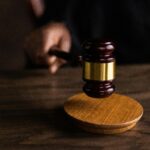Key Takeaways
- Knowing your rights and the stages of the legal process is crucial if you’re facing criminal charges.
- Even the innocent need a skilled defense attorney for protection and guidance in court.
- An informed approach to common legal scenarios maximizes your chances of a favorable outcome.
Introduction
Facing criminal charges is a daunting experience, and it’s common to search for reliable answers to your most pressing legal concerns. Whether you’ve been accused of a crime or simply want to understand your rights, being informed can make a significant difference in how you navigate the criminal justice process. Seeking early consultation with an experienced attorney in DUI defense or other criminal matters can significantly impact the outcome of your case and help you avoid common legal pitfalls.
Understanding the basics of criminal defense is essential not just for those currently facing charges, but for anyone looking to protect their rights should the need arise. The guidance of an experienced criminal defense lawyer is indispensable, especially when dealing with high-stakes scenarios where your freedom and future are at risk. In this article, you’ll find clear answers to some of the most frequent questions, including what to do if you’re arrested, your rights during police questioning, and how the expungement process works.
What Should I Do If I’m Arrested?
Remaining calm is paramount if you find yourself under arrest. Do not resist or argue with law enforcement. Instead, exercise your right to remain silent; everything you say can and will be used against you in court. Politely inform the arresting officers that you wish to invoke your right to an attorney. This protects you under the Fifth Amendment and ensures that your statements are not used out of context or against your best interests.
Do I Need a Lawyer If I’m Innocent?
Many people mistakenly believe that innocence is enough to secure their freedom. However, the justice system is complex and, at times, unforgiving. Without the guidance of a defense attorney, you might inadvertently make statements or decisions that jeopardize your case. A lawyer will help safeguard your rights, uncover evidence in your favor, and advocate tirelessly to ensure that an innocent person does not face unjust consequences.
What Are My Rights During Police Questioning?
Your rights during police questioning are anchored in the Miranda warning, which ensures you know you have the right to remain silent and the right to legal counsel. If police fail to inform you of these rights during a custodial interrogation, your statements may be ruled inadmissible in court. You are never obligated to answer questions without a lawyer present, and it is generally wise to wait for legal representation before making any statements.
What Is the Difference Between a Felony and a Misdemeanor?
Felonies and misdemeanors are distinguished primarily by the severity of the crime and the corresponding penalties. Felonies include serious offenses such as aggravated assault, robbery, and certain drug crimes, typically resulting in over one year in prison. Misdemeanors involve less serious offenses, carrying lighter penalties such as shorter jail time, probation, or fines. The specific classification depends on state laws and the circumstances of each offense.
Can I Refuse a Search by the Police?
Generally, you have the right to refuse consent to a police search if officers do not present a valid warrant. Exceptions exist, including situations where there is probable cause or if illegal evidence is plainly visible. Clearly stating that you do not consent preserves your rights and may be crucial if evidence becomes a central issue in your case.
Additionally, a DUI conviction can significantly impact various aspects of your life. It can affect your employment, especially if your job requires driving or a clean criminal record. Moreover, a DUI can lead to license suspension or revocation, making it difficult to commute and maintain employment. Understanding these consequences highlights the importance of legal rights and considerations during traffic stops or arrests.
What Is a Plea Bargain?
A plea bargain is a negotiated agreement between the defendant and the prosecutor, often allowing the accused to plead guilty to a lesser charge for a reduced sentence or dismissal of other charges. While plea bargains can expedite case resolution, it’s critical to consult your defense attorney to ensure the offer is fair and aligns with your best interests. Accepting a plea too quickly can limit your legal options if better outcomes could have been achieved at trial.
How Long Does a Criminal Case Typically Last?
The timeline for resolving a criminal case varies widely based on factors such as the nature of the charges, the amount of evidence, and court scheduling. Misdemeanor cases may resolve in a matter of months, while serious felonies can stretch into a year or longer. Your lawyer will give you a realistic timeline and update you as your case progresses.
Can a Criminal Record Be Expunged or Sealed?
Expungement or sealing of criminal records is possible in many jurisdictions for certain offenses. This process removes or restricts access to criminal history from public view, offering a second chance for employment, housing, and other opportunities. Eligibility depends on factors like the type of conviction and your criminal background. An attorney can tell you if you qualify and assist with the necessary legal filings to start the process.
When facing criminal accusations, your preparation and choice of defense counsel are critical. Take every question seriously, and never hesitate to seek legal advice to understand your rights, minimize risks, and protect your future.
Conclusion
Navigating the criminal justice system can be an overwhelming journey, but understanding your rights and the legal process is the first step toward a favorable outcome. As the justice system is complex, the guidance of a skilled criminal defense attorney is not just helpful but essential—even for the innocent. From exercising your right to remain silent during an arrest to understanding the nuances of plea bargains and the possibility of expunging your record, being informed empowers you to make sound decisions. Ultimately, an experienced legal professional can serve as your advocate, protecting your rights, challenging evidence, and ensuring your side of the story is heard, thereby maximizing your chances of a just resolution.









